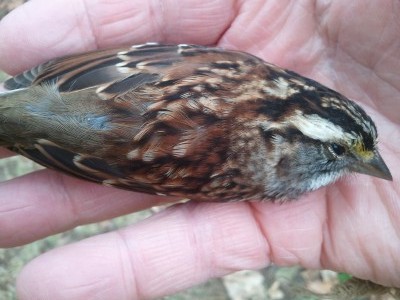 I did not hear the thump; later, I found it under one of the porch windows, unscathed and dead, more a figurine than a once living creature. I’ve kept the feeders and bird-baths away from the house to cut down on these accidents, but some still fly head-strong into reflections of trees and skies, and I find them later – always a small ghastly surprise to see such grace stilled and … finished.
I did not hear the thump; later, I found it under one of the porch windows, unscathed and dead, more a figurine than a once living creature. I’ve kept the feeders and bird-baths away from the house to cut down on these accidents, but some still fly head-strong into reflections of trees and skies, and I find them later – always a small ghastly surprise to see such grace stilled and … finished.
This one was a white-throated sparrow, its feathers so delicate and carefully pleated, as if only the hands of small children could have put it together. I turned it this way and that; its colors so much more nuanced up close, its perfection of form stopped by death so that only now could I look closely at it.
I don’t like to use the word ‘love’ easily or glibly. Its power lies in its gem-like rarity and should be kept for people, creatures and moments that we prize, and thus I say that I love birds and have for as long as I can remember. That said, I also do not believe in despair, a word that can be insidious in its appeal to a kind of romantic nihlism. But now some mixture of love and despair is my prevailing emotion when I think of all the wild creatures, birds especially.
Even as a boy I never envied them their ability to fly; I did not confuse them with the familiarity of comic book heroes. They seemed so much more fragile-tough and strange than that – shimmers lost in treetops, songs piercing the early morning, big birds waiting along highways, crows ganging their way raucously against summer skies, a cardinal-red against deep snow outside my parent’s kitchen window.
Birds brings us closest to wild animals in frequency of contact and in numbers, and the wild world is closing down. There are so many of us and our numbers and our need for food, space and all the industrial products of contemporary life are smashing and poisoning habitats; climate change has so accelerated that bird species cannot adapt. They need millennia to do so. They will have decades.
I am happy to see them come to my feeders these winter mornings but my pleasure overlays a persistent, dull anguish. Modernity is making them ghosts. They flicker before me.
What effect will a world of only rats and starlings have upon us?
A wonderful, young west coast poet has caught the essence of our species indispensable need to own, to wrench apart, to use, to exhaust — those verbs all lean on the heart of our shining, corrosive intelligence.
Poetry cannot save us, but if we will pick it up, it can help us see more clearly those wild shadows in the diminishing light.
In The Songbird Laboratory by Lauren Eggert-Crowe: dancing girl press & studio, 2013
White- latexed fingers extract the brain,
freeze it in dry ice, and slice it almond thin.
As soon as the beak opens and the song
rushes forth, they crack the skull’s shell,
fish out the lumped prize of proteins.
They must stop the hot humming
blood to map its melody. The canary
sings and dies, sings and dies.
Notes are taken, pitches graphed.
The feathered throat unjeweled.
Tighten the strings, friend. Tune
the wires against glove.
What darkness prompts the chime,
what we will do to know.